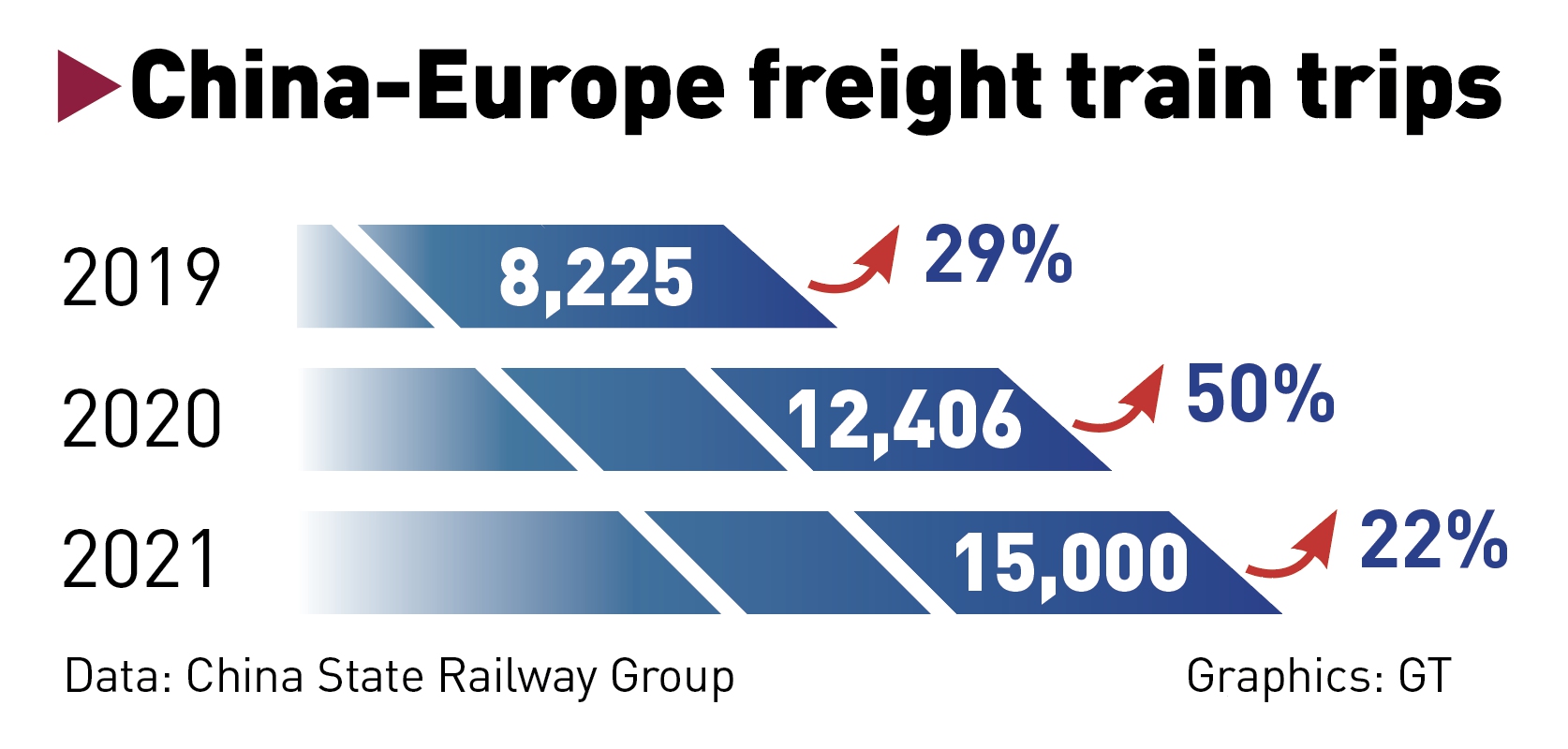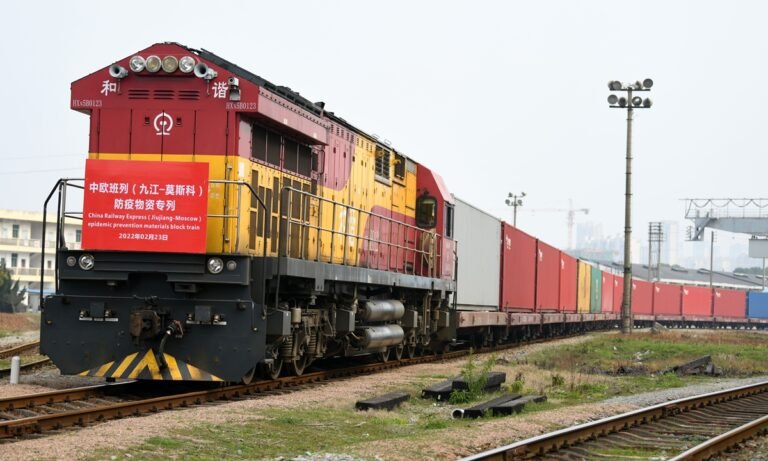A China-Europe freight train departs from Jiujiang, east China’s Jiangxi Province, on February 23, bound for Moscow. Photo: cnsphoto
Government officials, railway service providers and international traders are putting in place emergency measures to ensure the smooth operation and trade flow of the China-Europe freight train, a key transport channel for trade covering countries along the Belt and Road Initiative routes, amid the deteriorating situation in Europe.
While some major logistics companies in Europe and America have stopped accepting business from the China-Europe freight train, the channel itself has not stopped operating – the Europe-China railway via Poland, Belarus and Russia remains open, industry insiders told the Global Times.
But as Western sanctions on Russia widen, especially after Russian Railways appeared on the sanctions list, international traders in China are halting overseas orders while they assess the potential impact on rail freight across the continent, and some are seeking cargo insurance packages that cover war risks.
For example, four freight trains from China to Europe were originally scheduled to depart from the city each month, but the schedule changed after some companies began canceling orders, the Shanghai Observer reported. The paper claimed that the trains, originally scheduled to depart on March 7, were postponed to Thursday, with customers withdrawing about 40 containers.
The situation in Ukraine has caused many exporters, especially cash-on-delivery companies, to stop shipping to Russia, Ukraine and other countries in Europe and Central Asia, with many sellers canceling planned shipments, Feng Shubin, deputy head of the China-Europe Railway Express Transport Coordination Committee, told the Global Times in a recent interview.
“European shipping companies have started to (avoid) Russian railways, which is an important freight train transit between China and Europe, while trading companies have started to take a wait-and-see approach,” a veteran trader based in eastern China’s Zhejiang Province told the Global Times on Wednesday on condition of anonymity.
Market demand for trains in Shanghai has fallen by 40 percent due to geopolitical tensions, with train frequency cut in half, the Shanghai Observer reported.


Flexible work
Although the conflict in Ukraine has affected European customers and Chinese local traders from choosing cross-border freight trains to deliver goods in order to avoid risks, current rail operations from China to Europe remain safe and smooth, industry insiders said.
“Companies have felt the pressure from potential disruptions, but all railway lines are operating normally, except for those passing through Ukraine, which take up a small percentage and have already been diverted,” Tan said.
Shanghai is reportedly preparing to increase the number of trains returning from Germany and elsewhere.
Industry experts said the main concerns among international customers at present include the difficulty of getting compensation from insurance companies in case of damage or loss of goods, and the risk of not being able to get a rail freight settlement if Europe cuts off the intermediate settlement channel to Russia as part of ongoing economic sanctions. To secure goods, traders are seeking new insurance that covers all possible risks, including war risks.
“The war risk is an existing clause… Most insurance companies use the war risk as an additional insurance for all shipping risks,” Tommy Tan, president of Shanghai EBU Supply Chain Management, an agent for China-EU freight trains, told the Global Times on Wednesday.
But insiders said that as the situation in Europe deteriorated, rising shipping risks made it very difficult for traders to obtain war risk insurance.
In order to ensure the smooth running of train services, government officials and logistics companies are moving around to ensure that train services are not affected by the situation in Europe.
At a recent internal meeting with international traders, Han Jie, director of the Zhejiang Commerce Bureau, said on March 10 that the government will ensure the operation of the China-Europe freight train while helping manufacturers and traders be more proactive in managing risks, chinanews.com reported.
Also at the meeting, the Zhejiang branch of the People’s Insurance Corporation of China (PICC) and YXE Trading Service Group, the operator of the cross-border freight train in Yiwu, reached an agreement to strengthen the construction of the global supply chain. PICC will provide innovative insurance products and services that are in line with the business characteristics of the train service, according to a chinanews.com report.
A salesperson with a China-Europe freight train logistics service provider who attended the meeting told the Global Times that they are already talking with local insurance companies about coming up with a new, fully-covered insurance for freight train service, including war risk insurance.
“Negotiations have been ongoing for a week and range from insurance fees to the risks that insurance companies must cover. Although no agreements have been reached yet, we hope to have more information this week,” the source said.
The rail transit time between China and Europe has also been completely cut from 24 days at the start of the launch to 12 days, according to informed sources.
A Zhejiang-based trader said that despite potential hurdles, the rail channel remains his first choice, given the shorter shipping time compared to sea freight, which has a lower competitive advantage in the face of container shortages and narrowing the gap amid logistical hurdles posed by port congestion in many parts of the world.
“What takes 14 to 16 days or even less from Zhejiang to Hamburg in Germany by train may take up to a month or even longer by ship,” the person said.





